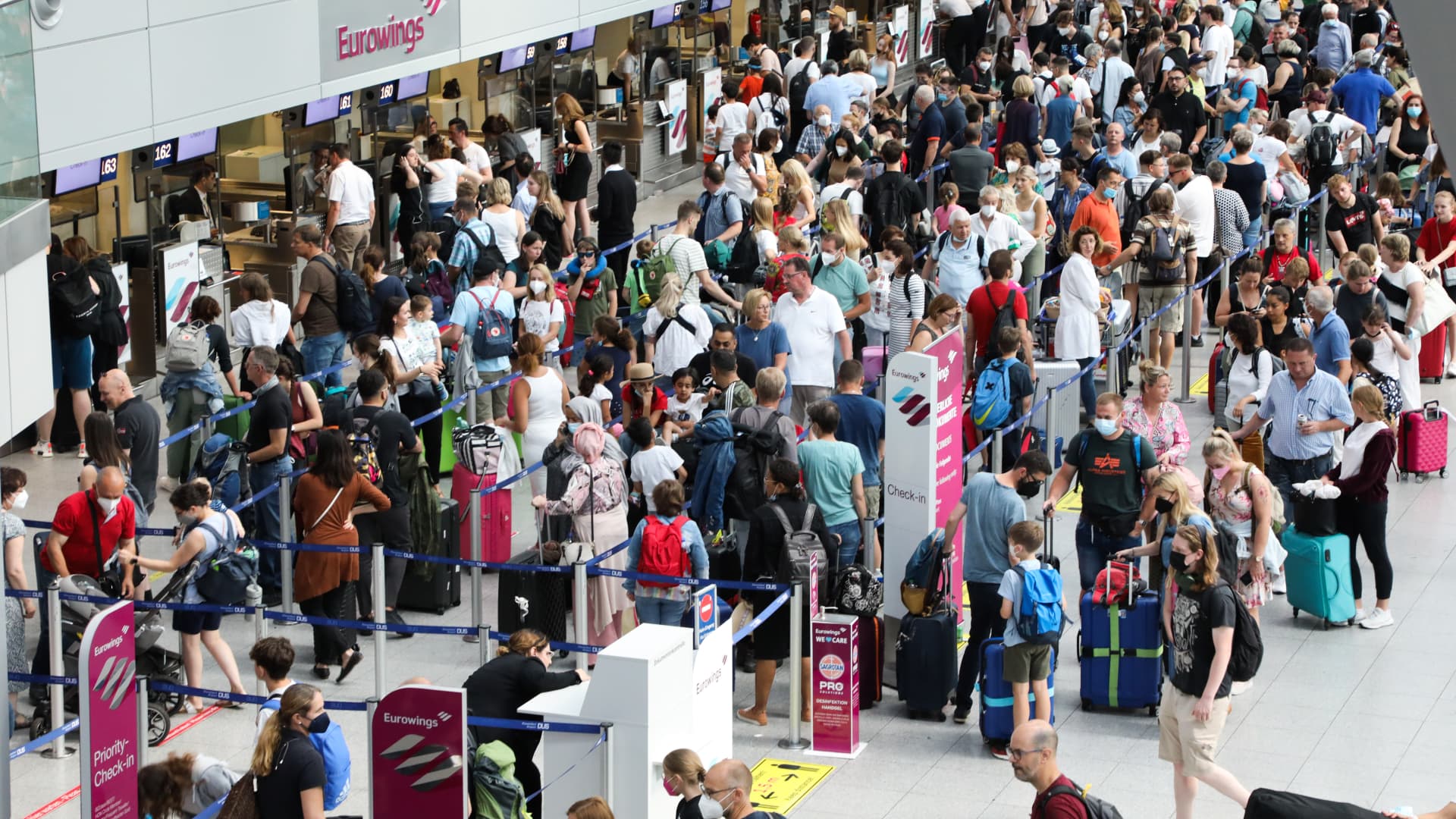LONDON — Delays, cancellations and strikes. It’s been a messy time for many European tourist hotspots as airlines and airports struggle to cope with pent-up travel demand after Covid-19 lockdowns.
Thousands of flights have been cancelled and recent travelers have queued for hours at passport control and luggage collection at airports across Europe — and the issues are expected to drag on.
“Air travel this summer is fraught with uncertainty, both for passengers and airlines,” Laura Hoy, equity analyst at Hargreaves Lansdown, told CNBC via email.
“Long delays and cancellations are likely grating on consumers’ desire to travel while airlines toe a fine line between trying to grasp hold of the post-pandemic travel boom and preparing for the likely slowdown ahead as economic conditions deteriorate.”
According to aviation data firm Cirium, 400 flights were canceled in all U.K. airports between June 24 and June 30, representing an increase of 158% from the same seven days in 2019.
And that’s outside of the peak summer season — usually between July and early September in Europe.
London’s busiest airport, Heathrow, asked airlines last week to cut flights, as passenger numbers were above what it could cope with. Some passengers were unaware their flight had been canceled, while others complained about the long queues.
There will be disruption continuing into the summer.Stephen FurlongStephen Furlong, senior industry analyst at Davy
Meanwhile, low-cost airline easyJet has cut thousands of flights over the summer in an attempt to minimize the risk of disorder.
Travelers have also faced similar issues in the U.S. as they looked to go away for the July 4 weekend, with more than 12,000 flights delayed and hundreds canceled.
And it’s unlikely that travel chaos will unwind in the coming months, according to Stephen Furlong, senior industry analyst at wealth manager Davy.
“There will be disruption continuing into the summer whether ATC [cargo] driven or ground handling or security staff or indeed self-inflicted labour issues from the airlines,” he added.
In France in June, a quarter of flights were canceled at the main airport in Paris due to a workers’ strike.
And more strike-induced disturbance could be on the way. British Airways is preparing for a staff strike in the coming weeks as workers demand that a 10% pay cut installed during the pandemic gets reversed. And Ryanair workers in Spain said over the weekend they would be striking for 12 days in July, pushing for better work conditions.
What’s causing the disruption?
There are several reasons for the travel chaos and they are mostly industry-wide problems, rather than a country- or airline-specific issue.
“The pace at which passengers have returned to the skies since the springtime has caught airlines a little bit by surprise and airports too. They simply don’t have the staff right now that we would need for a full schedule summer,” Alexander Irving, European transport analyst at AB Bernstein, told CNBC’s “Squawk Box Europe” last week.
Many airlines, airport operators and other companies within the travel sector laid-off workers during the pandemic as their businesses ground to a halt. Many of these workers looked for opportunities elsewhere and have not returned to the sector, while others were pushed into early retirement.
“Ultimately, we need more staff,” Irving said.
In addition, it’s hard to attract new talent right now given changes in the labor market, such as the so-called Great Resignation — when workers chose to quit their jobs, often without another one lined up, in search for a better work-life balance.
Hiring new people is also a medium to long-term solution, as in many travel-related jobs there’s compulsory training before workers can start their jobs.
At the same time, many of those who stayed in the sector do not feel sufficiently compensated and have complained about their work conditions.
It “probably ultimately means paying people more and treating them slightly better,” Irving said about the labor issues and strikes.
At Amsterdam’s Schiphol airport, a group of cleaners, baggage handlers and security staff will be paid an additional 5.25 euros ($5.55) per hour this summer, according to Reuters. However, the same airport announced that it will be limiting its volume of passengers this summer, especially to reduce disruptions.
Other countries are also scrambling to improve the situations are their airports. In Spain, police are hiring more staff at some of the country’s busiest airports and Portugal is also increasing its border control staff.
“The response by most companies as the pandemic hit was to reduce capacity on the expectation for a sustained period of lower growth. However, the pandemic delivered a different outcome: one where the global economy was virtually switched off then switched back on within a short period of time,” Roger Jones, head of equities at London & Capital, told CNBC.
He said that on top of the labor market shortages, inflation is also an issue.
“Cost inflation, especially fuel and wages, is aggravating the situation and making it a really difficult operating environment, which is weighing on profitability,” he said via email.
Many airlines, including British Airways and Air France-KLM, received financial support from governments during the pandemic to avoid collapse. However, a number of unions and airlines are now demanding more help from governments to support the revival of the sector.
Despite the strikes, cancellations and other disruptions, some analysts are still positive about the sector and argue that the recent situation has been “overplayed.”
“I do feel though it’s overplayed by the media and the vast majority of flights are operating and on time. Ryanair, for example, while operating 115% of pre-Covid capacity have planned for this and have largely avoided disruption so far,” Davy’s Furlong said via email.
